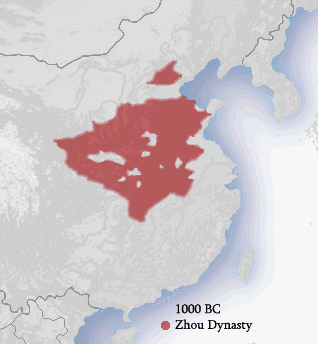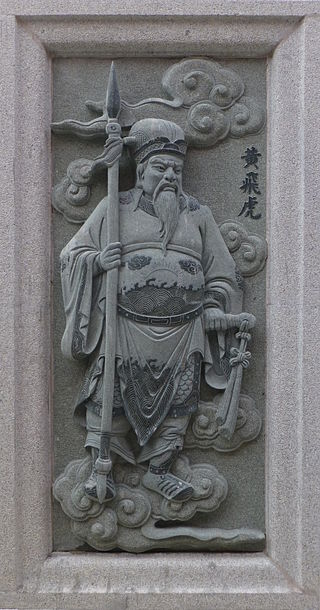
The Zhou dynasty was a royal dynasty of China that existed for 789 years from c. 1046 BC until 256 BC, the longest of such reign in Chinese history. During the Western Zhou period, the royal house, surnamed Ji, had military control over ancient China. Even as Zhou suzerainty became increasingly ceremonial over the following Eastern Zhou period (771–256 BC), the political system created by the Zhou royal house survived in some form for several additional centuries. A date of 1046 BC for the Zhou's establishment is supported by the Xia–Shang–Zhou Chronology Project and David Pankenier, but David Nivison and Edward L. Shaughnessy date the establishment to 1045 BC.

The Shang dynasty, also known as the Yin dynasty, was a Chinese royal dynasty that ruled in the Yellow River valley during the second millennium BC, traditionally succeeding the Xia dynasty and followed by the Western Zhou dynasty. The classic account of the Shang comes from texts such as the Book of Documents, Bamboo Annals and Records of the Grand Historian. Modern scholarship dates the dynasty between the 16th and 11th centuries BC, with more agreement surrounding the end date than beginning date.
The 1040s BC is a decade which lasted from 1049 BC to 1040 BC.
The Western Zhou was a period of Chinese history corresponding roughly to the first half of the Zhou dynasty. It began when King Wu of Zhou overthrew the Shang dynasty at the Battle of Muye and ended in 771 BC when Quanrong pastoralists sacked the Zhou capital at Haojing and killed King You of Zhou. The "Western" label for the period refers to the location of the Zhou royal capitals, which were clustered in the Wei River valley near present-day Xi'an.
The consort kin were the kin or a group of people related to an empress dowager or a consort of a monarch or a warlord in the Sinosphere. The leading figure of the clan was either a sibling, cousin, or parent of the empress dowager or consort.

King Wu of Zhou, personal name Ji Fa, was the founding king of the Chinese Zhou dynasty. The chronology of his reign is disputed but is generally thought to have begun around 1046 BCE and ended with his death three years later.

Gija Joseon was a dynasty of Gojoseon allegedly founded by the sage Jizi (Gija), a member of the Shang (Yin) dynasty royal house.

Dan, Duke Wen of Zhou, commonly known as the Duke of Zhou, was a member of the royal family of the early Zhou dynasty who played a major role in consolidating the kingdom established by his elder brother King Wu. He was renowned for acting as a capable and loyal regent for his young nephew King Cheng, and for successfully suppressing the Rebellion of the Three Guards and establishing firm rule of the Zhou dynasty over eastern China. He is also a Chinese culture hero traditionally attributed authorship of the I Ching and the Classic of Poetry, and establishing the Rites of Zhou.

Jiang Ziya, also known by several other names, was a Chinese military general, monarch, strategist, and writer who helped kings Wen and Wu of Zhou overthrow the Shang in ancient China. Following their victory at Muye, he continued to serve as a Zhou minister. He remained loyal to the regent Duke of Zhou during the Rebellion of the Three Guards; following the Duke's punitive raids against the restive Eastern Barbarians or Dongyi, Jiang was enfeoffed with their territory as the marchland of Qi. He established his seat at Yingqiu. He is one of the main heroes of the Fengshen Bang.

The Battle of Muye, Mu, or Muh took place in ancient China between the rebel Zhou state and the reigning Shang dynasty. The Zhou army, led by Wu of Zhou, defeated the defending army of king Di Xin of Shang at Muye and captured the Shang capital Yin, ending the Shang dynasty. The Zhou victory led to the establishment of the Zhou dynasty, and is used in Chinese historiography as a justified example of the doctrine of the Mandate of Heaven.
The Xia–Shang–Zhou Chronology Project was a multi-disciplinary project commissioned by the People's Republic of China in 1996 to determine with accuracy the location and time frame of the Xia, Shang, and Zhou dynasties.

King Wen of Zhou was the posthumous title given to Ji Chang, the patriarch of the Zhou state during the final years of Shang dynasty in ancient China. Ji Chang himself died before the end of the Zhou-Shang War, and his second son Ji Fa completed the conquest of Shang following the Battle of Muye, and posthumously honored him as the founder of the Zhou dynasty. Many of the hymns of the Classic of Poetry are praises to the legacy of King Wen. Some consider him the first epic hero of Chinese history.
Huo is a Chinese surname. It is pronounced as Fok in Cantonese.

Huang Feihu is a fictional character in the Chinese epic fantasy novel Fengshen Bang. Originally known as Prince Wucheng of the Shang dynasty, he defects to Xiqi, a vassal state under Shang, after the tyrannical King Zhou of Shang caused the death of his wife. He brings along his two younger brothers, three sons, four close friends, and hundreds of followers loyal to him. Huang Feihu later participates in the campaign led by King Wu of the Zhou dynasty to overthrow King Zhou of Shang. He is killed in action during a battle against the Shang general Zhang Kui (張奎).
Cai Shu Du or Shu Du of Cai, given name Du, was the first ruler of the State of Cai.
The King of Wu or Prince of Wu was a title referring to Chinese rulers of the area originally controlled by the Gou Wu tribes around Wuxi on the lower Yangtze, generally known as the Wu region. The title wang is written identically in Chinese, but it is common in English to distinguish between the scions of the imperial dynasties and the dynasties of independent lords.
Guan was an ancient Chinese city-state in present-day Henan. Its capital was Guancheng or Guan City (管城) in present-day Guancheng Hui District of Zhengzhou and its power was limited to the immediate surrounding area.
Wu Geng or Wugeng, a.k.a. 祿父 Lùfù, was an ancient Chinese noble who was the son of Zhou, the last king of the Shang. After his father executed Bigan by cutting out his heart, Wugeng fled to Feng, the capital of the Zhou state, together with his uncles Weizi and Weizhong to plead King Wu of Zhou for help. Shortly afterward King Wu attacked the Shang and defeated King Zhou at the Battle of Muye, thus establishing the Zhou dynasty. Wugeng was allowed to stay in Yin, the old Shang capital, and rule it as a princedom and a vassal lord to King Wu.

The Rebellion of the Three Guards, or less commonly the Wu Geng Rebellion, was a civil war, instigated by an alliance of discontent Zhou princes, Shang loyalists, vassal states and other non-Zhou peoples against the Western Zhou government under the Duke of Zhou's regency in late 11th century BC.
The periodization of the Shang dynasty is the use of periodization to organize the history of the Shang dynasty in ancient China. The Shang dynasty was a Chinese royal dynasty that ruled in the Yellow River valley for over 500 years, traditionally succeeding the Xia dynasty and followed by the Zhou dynasty. According to the conventional narrative of later transmitted texts, the Shang clan, led by their great leader Tang, defeated Jie of the Xia dynasty and founded a new dynasty known as Shang. The Shang moved their capital several times during the existence of the dynasty, eventually settling in a place called Yin, later known in the transmitted texts as Yinxu, located on the outskirts of the modern city of Anyang. It was eventually conquered by the Predynastic Zhou led by King Wu following the Battle of Muye in ca. 1046 BC, which led to the establishment of the Western Zhou dynasty. Scholars divide the Shang dynasty into periods for convenience, usually relating to the location of the dynasty's capital.









